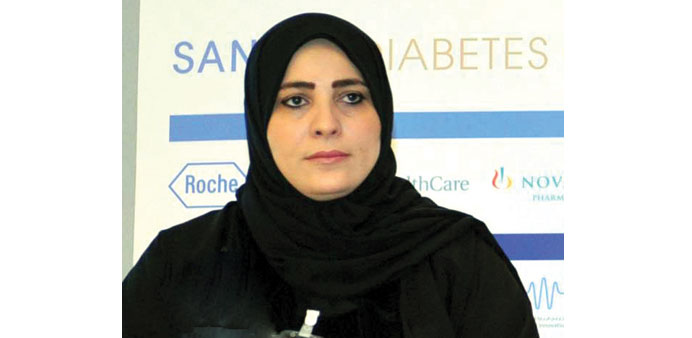According to the latest statistics, Qatar has one of the highest diabetes prevalence rates in the world with 17.5% of the adult population suffering from the disease
By Joseph Varghese
Staff Reporter
With the escalating diabetes rates in Qatar and the Arab region, there is a need for an educational strategy to control the disease, an official from the Hamad Medical Corporation (HMC) urged yesterday.
“The health bodies in each country should adopt a structured educational programme suitable for each country,” stated Manal Musallam, senior patient educator, adult diabetes at HMC.
She was addressing a session on “Promoting the Rights of Children with Type 1 Diabetes in School” at the Arab Diabetes Medical Congress, which concluded yesterday.
According to the latest statistics, Qatar has one of the highest diabetes prevalence rates in the world with 17.5% of the adult population suffering from the disease.
“The educational programme must be a comprehensive one with quality assurance involving all major stakeholders,” she explained while suggesting it should involve clinical nurses, parents, community leaders and media representatives who must look into all the aspects and provide specific guidelines in its implementation.
“In Qatar, we are in discussion with various sections of the community for such a move. Something might come up in this direction soon and it might get a concrete shape by the World Diabetes Day in November this year.”
At the conference yesterday, several key issues on diabetes were discussed with experts pointing to the latest technologies available in managing and treating diabetes. Dr Bassam Saleh Binabbas, a consultant at King Faisal Specialist Hospital and Research Centre, Saudi Arabia, highlighted new applications and technological devices in treating diabetes.
“Mobile phone technology can be used as a supplement in the treatment of diabetes. The technology is being used to conduct several surveys and collecting feedback from the participants. The participants are provided information on diabetes and are also asked about their knowledge about the disease as well as the symptoms of the disease.”
Binabbas also spoke about several gadgets and applications available on the mobile technology platform that can be used in controlling and managing diabetes such as Gocap, Smart Lenses among others. He highlighted that a SIM card attached to the application of Gocap can monitor whether a patient has got the right amount of insulin at the right time and alert the patient accordingly.
At another session of the meeting, diabetes patients were given several tips on fasting during the holy month of Ramadan. Dr. Khaled Abdul Rahman Tayeb from Al Noor Hospital, Saudi Arabia, pointed out that diabetes patients fasting during Ramadan have to follow certain guidelines.
“People who are on high risk of diabetes should monitor their sugar levels five times a day and those not at high risk should monitor their sugar level three times a day,” he recommended.
A dietician on the panel suggested that carbohydrates, fibre and proteins must be part of the diet of the diabetics after their fasting.

Manal Musallam: underlines the need for an educational programme to control the spread of diabetes.
